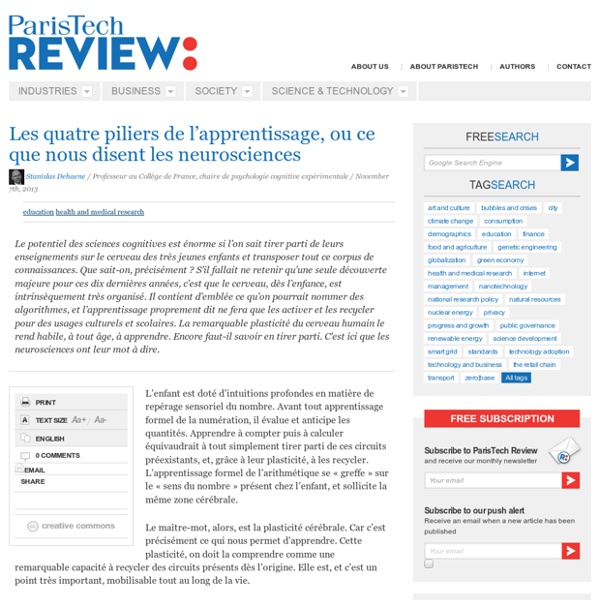



http://www.paristechreview.com/2013/11/07/apprentissage-neurosciences/
Related: Sciences cognitives et neuroéducation • Neurosciences35 Psychology-Based Learning Strategies For Deeper Learning 35 Psychology-Based Critical Thinking Strategies by Sara Briggs, opencolleges.edu.au Have you ever considered letting your students listen to hardcore punk while they take their mid-term exam? Decided to do away with PowerPoint presentations during your lectures? Urged your students to memorize more in order to remember more? [ETUDE SCIENCE] Conscious Brain-to-Brain Communication in Humans Using Non-Invasive Technologies Human sensory and motor systems provide the natural means for the exchange of information between individuals, and, hence, the basis for human civilization. The recent development of brain-computer interfaces (BCI) has provided an important element for the creation of brain-to-brain communication systems, and precise brain stimulation techniques are now available for the realization of non-invasive computer-brain interfaces (CBI). These technologies, BCI and CBI, can be combined to realize the vision of non-invasive, computer-mediated brain-to-brain (B2B) communication between subjects (hyperinteraction). Here we demonstrate the conscious transmission of information between human brains through the intact scalp and without intervention of motor or peripheral sensory systems.
What is Mindset Every so often a truly groundbreaking idea comes along. This is one. Mindset explains: Why brains and talent don’t bring success How they can stand in the way of it Why praising brains and talent doesn’t foster self-esteem and accomplishment, but jeopardizes them How teaching a simple idea about the brain raises grades and productivity What all great CEOs, parents, teachers, athletes know Mindset is a simple idea discovered by world-renowned Stanford University psychologist Carol Dweck in decades of research on achievement and success—a simple idea that makes all the difference. In a fixed mindset, people believe their basic qualities, like their intelligence or talent, are simply fixed traits.
The student Voice: Our Survey, part 5 – Common Practices That Don’t Work One question from our student survey that generated very specific and (I think) helpful responses was: What is a very common teacher practice that occurs all the time in class but just does not work for you? Here is a representative sample of the responses: Taking notes of the projector and it doesn’t work because it doesn’t help me to understand and take it in if I am just mindlessly writing down notesReading to me does not work for me.just taking notes and listening to lectures. It always makes me tire and uninterested. I just can never fully focusTaking notes.Lecturing, it’s boring for the students and most people tend to zone out and not pay attention anyways.When the teacher tells us something and then expects us to know how to do it without example problems and such and it doesn’t work because we haven’t learned how to do it yet so we dont know how to go about the problemreading from books or articles“busy work!”
Entrance testing is not the answer University students need to learn to write for different disciplines and assignments, and testing the skills they learned in high school isn’t relevant to what they will need to learn. by Roger Graves and David Slomp We commend Nicholas Dion and Vicky Maldonado for calling for assessments of university students’ writing (“We need to assess student literacy skills”) in University Affairs. We agree with their argument that without these assessments, universities will face budget cuts and students have no way of proving their worth as writers. However, we disagree that entrance testing at the university level will contribute to solving this problem.
The Neuroscience Of Learning: 41 Terms Every Teacher Should Know The Neuroscience Of Learning: 41 Terms Every Teacher Should Know by Judy Willis M.D., M.Ed., radteach.com As education continues to evolve, adding in new trends, technologies, standards, and 21st century thinking habits, there is one constant that doesn’t change. The human brain. But neuroscience isn’t exactly accessible to most educators, rarely published, and when it is, it’s often full of odd phrasing and intimidating jargon. Worse, there seems to be a disconnect between the dry science of neurology, and the need teachers have for relevant tools, resources, and strategies in the classroom.
Sleep 'resets' brain connections crucial for memory and learning, study reveals For Jules Verne it was the friend who keeps us waiting. For Edgar Allan Poe so many little slices of death. But though the reason we spend a third of our lives asleep has so far resisted scientific explanation, research into the impact of sleepless nights on brain function has shed fresh light on the mystery - and also offered intriguing clues to potential treatments for depression. In a study published on Tuesday, researchers show for the first time that sleep resets the steady build-up of connectivity in the human brain which takes place in our waking hours. The process appears to be crucial for our brains to remember and learn so we can adapt to the world around us. The loss of a single night’s sleep was enough to block the brain’s natural reset mechanism, the scientists found.
The Role of Metacognition in Learning and Achievement Excerpted from “Four-Dimensional Education: The Competencies Learners Need to Succeed,” by Charles Fadel, Bernie Trilling and Maya Bialik. The following is from the section, “Metacognition—Reflecting on Learning Goals, Strategies, and Results.” Metacognition, simply put, is the process of thinking about thinking. It is important in every aspect of school and life, since it involves self-reflection on one’s current position, future goals, potential actions and strategies, and results.